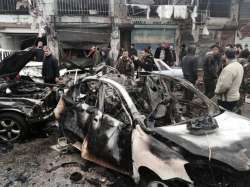Syria: 10 killed in car bomb attack in government held town
At least 10 civilians were killed in a car bomb attack in Syrian government-held coastal town on Thursday. The explosion shook a main street in Jableh, in the coastal Latakia province, a stronghold of President

At least 10 civilians were killed in a car bomb attack in Syrian government-held coastal town on Thursday.
The explosion shook a main street in Jableh, in the coastal Latakia province, a stronghold of President Bashar Assad and the heartland of Syria's Alawites, a Shiite offshoot to which Assad's family also belongs.
It was the first such large-scale bombing since the cease-fire was agreed on last week, to prepare the way for peace talks between Assad's government and opposition in Kazakhstan later this month.
Videos from the scene of the blast, which state media said was a car bomb, show extensive damage to shops lining a commercial street near the town's municipal stadium. Blood pooled on the pavement and several cars lay charred or overturned as fire fighters scrambled to put out fires.
Qusay al-Khalil, the head of the local hospital, said the blast also severely wounded at least 30 people. "The explosion shook the town," he told state TV, adding that it prompted a state alert at his hospital.
The Britain-based Syrian Observatory for Human Rights, which tracks the civil war, put the death toll at 15, including a son of a leading Syrian military commander. The monitoring group relies on a network of activists on the ground in Syria.
No group immediately claimed responsibility for the bombing. Although explosions are rare in government-controlled Latakia, Jableh was rocked in May last year by a string of blasts that first hit in a crowded bus station, then outside a hospital receiving the wounded, killing a total of about 120 people. Those attacks were claimed by the Islamic State group.
IS and the al-Qaida-linked Fatah al-Sham Front are not part of the broad truce that the Syrian government and the opposition agreed on last week.
The cease-fire, which came into effect on Dec. 30, has mostly held but not altogether halted fighting in the country. Fierce clashes continue in the Barada Valley, a major source of water for Damascus, and in other isolated regions. Both the government and the rebels have accused the other side of violating the truce.
The United Nations said Thursday it has received reports that at least 7,000 people have been displaced by fighting in the Barada Valley. U.N. spokesman Stephane Dujarric said an estimated 45,000 people live in the area.
Dujarric also said the U.N. has rehabilitated and equipped 120 wells in and around Damascus that cover about one-third of the city's daily water needs.
Syria's al-Qaida-linked group in comments published Wednesday called the cease-fire "humiliating" and said that those who agreed to it made a "big mistake."
Latakia province police chief Yasser al-Shariti told state TV the explosion hit during rush hour, when government employees and students would have been crowding one of the town's busiest streets.
Others said the area was packed with shoppers, many coming from or going to a popular vegetable market nearby. Jableh is also home to thousands of internally displaced Syrians who have sought refuge in the relative calm of the government-controlled town.
Under the new cease-fire, Russia and Iran are tasked with ensuring compliance by the Syrian government and its allies, while Turkey is serving as a guarantor for the rebels. On Wednesday, Turkey called on Iran to rein in the pro-government forces. Tehran countered by accusing the opposition of dozens of violations and called Turkey's comments "unconstructive."
The government in Damascus says the truce does not apply in the Barada Valley because of the presence of al-Qaida-linked fighters. But activists and rebel groups have challenged the government claim, with some arguing the militants don't operate in the area. The rebels have said all areas not ruled by IS are covered under the agreement.
In Geneva, the U.N. envoy for Syria said Thursday he welcomed preparations for the Russia- and Turkey-brokered peace negotiations in Astana, Kazakhstan's capital, saying the gathering could undergird new U.N.-mediated talks between the warring sides. Staffan de Mistura acknowledged violent "incidents" in Syria the truce began, but added that he believed the powers would "succeed in overcoming them."
However, nearly a dozen rebel groups announced on Monday they were suspending talks about the negotiations because of cease-fire violations.
A senior Iranian lawmaker Alaeddin Boroujaerdi, on a visit to Damascus, stressed on Thursday that as the al-Qaida-linked group and IS are not part of the agreement, "matters are settled with them on the battlefield." Boroujaerdi, who is in charge of foreign policy and national security portfolios in Iran's Shura Council, said that for any truce to hold, all militant groups must leave Syria.
The presence of al-Qaida-linked militants, who fight alongside other rebel factions and have been credited with some of their biggest victories, has undermined past truce attempts. The Fatah al-Sham Front, formerly known as the Nusra Front, announced last year that it had severed tied with al-Qaida, but is still widely believed to be linked to the global terror network.
Fatah al-Sham spokesman al-Shafei said in an interview published late Wednesday by Al-Jazeera Net that the current truce only protects Assad and allied Iranian-backed militias.
"The people of (Syria) didn't offer all these sacrifices to be handed this humiliating agreement," he was quoted as saying. The Syrian rebellion "today needs someone to ... strengthen its political position by battlefield achievements," he said.
The rebels demand that any future solution for Syria include Assad's exit from power.But Boroujaerdi said peace talks should not put any conditions on the Syrian leadership.
He also chastised Turkey for sending troops into northern Syria as one in a series of Ankara's policy "mistakes." He added that any troops in Syria without the government's approval or permission should leave "immediately."
AP inputs